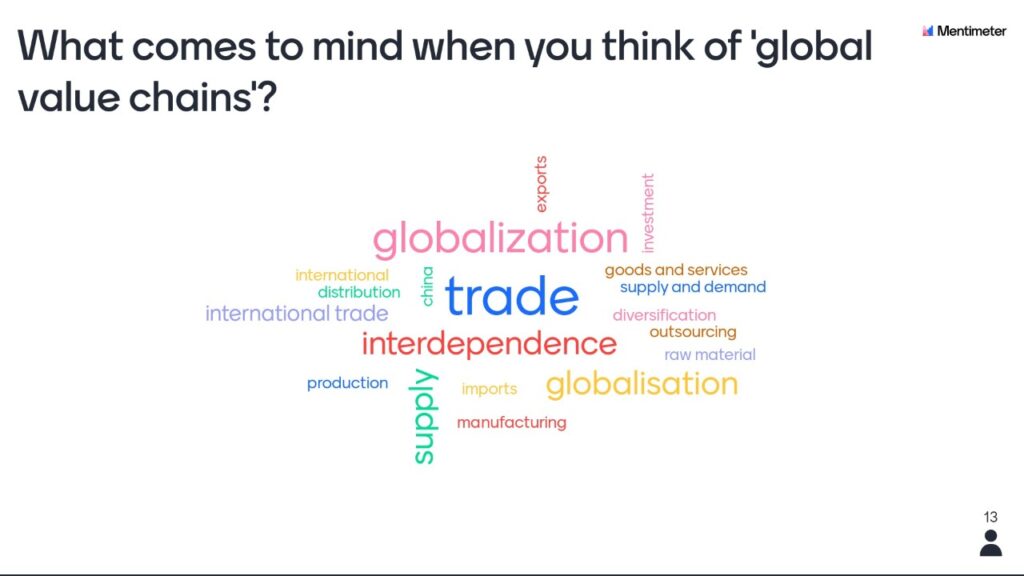
FKP hosted by the Center for Indonesian Policy Studies (CIPS) with Andree Surianta (CIPS), Ashley Vines (University of Melbourne), and Siswo Pramono (Ministry of Foreign Affairs of Indonesia)
FKP hosted by the Center for Indonesian Policy Studies (CIPS) with Andree Surianta (CIPS), Ashley Vines (The University of Melbourne), and Siswo Pramono (Ministry of Foreign Affairs of Indonesia). Thursday, 9 July 2020.
Keypoints:
- The Global Value Chain (GVC) has been restructuring in the past few years and the COVID-19 pandemic is accelerating the process with multi-national enterprises (MNEs) diversifying their supply by relocating their investment to countries in Southeast Asia.
- Indonesia can potentially benefit from the situation by stepping into the supply chain but “regulatory obesity” is proving to be a hindrance, such as in the case of the pharmaceutical industry. Rather than relying on incentives to attract foreign investments (which are a burden to the state budget), Indonesia should implement structural improvement and continue to exhibit political stability.
- Indonesia should also considering being a global investor to extend its participation in the GVC such as through agricultural investment in Northern Australia.
___________________________________________________________________
- The diversification or shift of the GVC is not a recent phenomenon. China, as a major supplier in many global industries, have been experiencing declining exports and FDI in the past two years as manufacturing wage level in the country increases. This condition led to relocation of MNEs to Southeast Asian countries such as Vietnam and Thailand where manufacturing wages are lower.
- The COVID-19 pandemic is resulting in both a supply and demand shock, as both production and consumption activities are halted due to measures to contain the spread of the virus such as physical and social distancing, travel restrictions, and closure of services. These measures have disrupted the GVC, and to ensure survival MNEs are pushed to diversify their supply chain to other countries, particularly to Southeast Asia.
- In the case of the pharmaceutical industry the demand shock is compounded by a supply shock as a result of a strict lockdown in many regions in China, a major supplier and manufacturer in the industry. The situation provides an opportunity for countries like Indonesia to step in as an alternative manufacturing location and thus join the pharmaceutical GVC.
- While the condition should benefit Indonesia, the country have been experiencing a poor record in attracting foreign direct investments (FDI).
- Data from 2005-2015 show declining domestic value-added share in foreign final demand across nearly all sectors including the chemicals sector (highlighted with a red arrow in the figure below), a category that includes the pharmaceutical industry.
- In 2017, 137 Japanese companies relocated to Southeast Asia and only 10 to Indonesia; in 2019, 33 companies moved out from China and none of them relocated to Indonesia.
- Indonesia’s main issue in acquiring FDI lies with “regulatory obesity” – presence of many overlapping and contradicting rules. In the case of the pharmaceutical industry, some examples of barriers for FDI are as follows:
- At the national level, there is an issue in ensuring the intellectual property protection for foreign patents.
- At the ministerial level, the current law requires that drugs registered in Indonesia are wholly produced locally; this forced local production is not always economically efficient as Indonesia’s current market size does not justify the scale of production needed for efficiency. There are also price ceilings for generic drugs which makes production unattractive.
- In terms of attracting investments in new pharmaceutical product, there is a requirement for local content leading to rent-seeking behavior as the verification is self-declared without sanctions. There is a proposed tax deduction for manufacturers, but this incentive creates burden to the state budget and may not be enough to counteract the patent effect.
- According to the Indonesian Investment Coordinating Board (BKPM), there are currently 7 companies that will relocate to Indonesia and 17 more showing interest. This shows that Indonesia still have some potential in attracting FDI. Additionally, Indonesia is performing well in the Fragile State Index, indicating the geopolitical advantage of a stable country. Indonesia’s rank in this Index has been improving in recent years, and the country is currently better ranked than other Asian countries such as China and Thailand.
- In order to attract more FDI, Indonesia should address some industry-specific issues. In the case of the pharmaceutical industry, for example:
- Indonesia needs to have an outward looking policy stance and not rely on the domestic market.
- Incentives are costly and unsustainable and should not replace structural reforms.
- Ministerial regulations need to be reviewed to not deter expansion and to not create rent-seeking opportunities.
- As Indonesia’s investment capacity grows along with its GDP and population, Indonesia may also participate in the GVC as the investor, such as by investing in agriculture in Northern Australia.
- Such investment may lead to less tariff and non-tariff measures (since they impact Indonesian investors) and create better certainty for potential investors.
- Importing goods to Indonesia may then be less politically sensitive if the commodities are produced by Indonesian enterprises in a foreign country.
- There is an alignment between Indonesian top commodity imports and North Australian potential commodity supply which presents an opportunity for Indonesia to fulfill its future consumption needs
- The investment may draw benefits from Australian research and development as well as proximity to Indonesia.
- Although the investment is high risk, it presents long-term potential.
Participants include fellow researchers, government officials, and journalists. During the Q&A section, participants asked about Indonesia’s ability to expand production globally, and whether FDI actually absorb Indonesian labor force. In regards to the investment opportunity in North Australian agriculture, comments were raised about the indigenous land rights in Northern Australia and the issue of self-sufficiency and sovereignty.
Media coverage: https://www.thejakartapost.com/news/2020/07/06/nontariff-barriers-disadvantage-poor-people-think-tank.html





